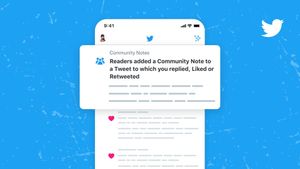JAKARTA - Google is conducting a trial that blocks access to news content for some users in Canada. This was confirmed by the company on Wednesday, 22 February. This is a test run of a potential response to the Canadian government's online news law.
The "Online News Act" or Bill C-18, introduced in April 2022 by President Justin Trudeau's Liberal government, created rules to force platforms like Meta's Facebook and Google to negotiate commercial deals and pay news publishers for their content.
"We are testing potential product responses to Bill C-18 which affects a very small percentage of Canadian users. We run thousands of tests annually to assess any potential changes to Search," a Google spokesperson said in a written statement to Reuters.
The tech giant confirmed that this limited-time test, which affected a random sample of less than 4% of users in Canada, "limited the visibility of Canadian and international news to varying degrees."
A spokesman for Canada's Minister of Culture, Pablo Rodriguez, said Canadians would not be intimidated and called it disappointing that Google adopted the playbook Meta.
"Canadians need to have access to quality, fact-based news at local and national levels, and that's why we're introducing the Online News Bill. The tech giant needs to be more transparent and accountable to Canadians," the spokesperson said.
VOIR éGALEMENT:
Last year, Facebook warned that it might block sharing of news content on its platform in Canada over concerns about legislation that would force digital platforms to pay news publishers.
Similar laws are already in effect in Australia, and came into effect in March 2021 after talks with major tech companies resulted in the temporary shutdown of Facebook's news feed in the country. It has been successful, according to a government report.
The Canadian news media industry has put pressure on Facebook and called on the government to better regulate technology companies, to allow the industry to recoup the financial losses it has suffered in recent years as Facebook and Google continue to gain a larger share of the advertising market. More than 450 news outlets in Canada have closed since 2008, including 64 in the past two years.
While in Indonesia this is also being discussed between the Ministry of Communication and Information with the media and news publishers. The Indonesian government still does not have specific laws governing journalistic copyright or publisher rights like those in Australia and the European Union.
However, several media organizations in Indonesia have pushed for the government to introduce such regulations. They argue that such regulations can help overcome financial losses caused by the unfair use of content practices by technology platforms such as Google and Facebook.
The Indonesian government itself has not taken any official action regarding this issue, but the government has introduced several other policies aimed at supporting the sustainability of the media industry in Indonesia.
The problem of regulation of journalistic copyright or publisher rights is indeed a complex issue and difficult to overcome. However, some solutions to consider include:
Encourage the creation of laws that regulate journalistic copyright or publishing rights. With clear and unequivocal laws, technology platforms like Google and Facebook will have an obligation to pay news publishers for the content they use.
Making deals between news publishers and technology platforms. Through this deal, the technology platform will pay news publishers for the content they use. This kind of agreement has been implemented in several countries such as Australia and the European Union.
The English, Chinese, Japanese, Arabic, and French versions are automatically generated by the AI. So there may still be inaccuracies in translating, please always see Indonesian as our main language. (system supported by DigitalSiber.id)


















